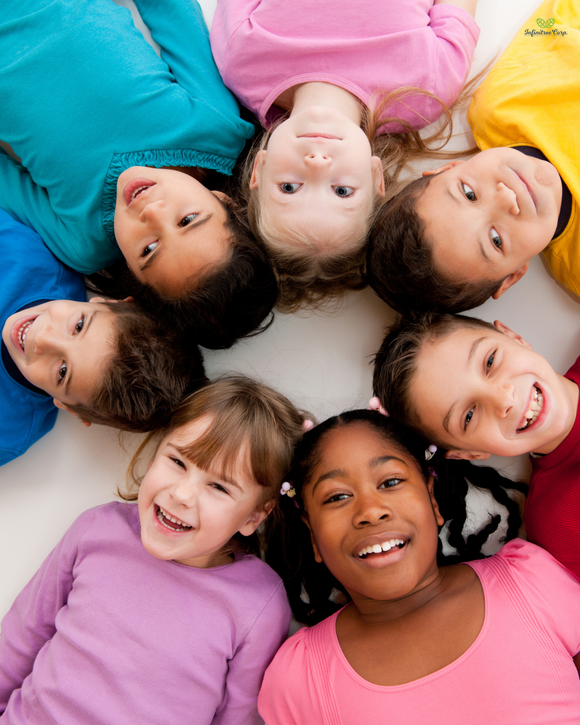
How Sibling Rivalry Affects Growth and Wellbeing
InfinitreeEditor.Jo
Two Kids, One Growth Gap
Emma and Noah are just two years apart. They eat the same meals, go to the same school, and live under the same roof. But by the time Noah turned 11, he had already outgrown Emma in height—despite being the younger sibling.
Emma’s parents were puzzled. She was active and healthy, but more withdrawn and often anxious. She constantly compared herself to her brother—his grades, his speed, his popularity. What they didn’t realize was that her emotional stress might have been affecting her physical development.
When they made small changes—separating their activities, validating Emma’s unique strengths, and creating moments of calm—her mood improved, and her pediatrician later noted she was back on track for her age group in growth.
Sibling rivalry isn’t just a behavioral issue. It can have real, physical consequences.
Why Sibling Dynamics Influence Growth
Sibling rivalry is natural. But if it becomes chronic or emotionally draining, it can:
-
Elevate stress levels
-
Impact appetite and sleep
-
Affect self-esteem and confidence
-
Discourage physical activity or motivation
-
Trigger internalized feelings of “not good enough”
All of these can interfere with the biological processes that drive growth.
The Hidden Physical Effects of Sibling Rivalry
Let’s look at how emotional tension between siblings might affect the body:
🧠 1. Chronic Stress Elevates Cortisol
When a child constantly feels compared or criticized—especially by a sibling dynamic—it can trigger persistent low-level stress. Cortisol (the stress hormone) can:
-
Suppress growth hormone secretion
-
Disrupt digestion and nutrient absorption
-
Interfere with deep, restorative sleep
🛏️ 2. Sleep Disruption Affects Growth Hormone Cycles
Sibling fights at night, bedtime anxiety, or just feeling emotionally unsettled can impact how quickly and deeply a child falls asleep.
This matters because most growth hormone is released during deep sleep—especially in the early part of the night.
🍽️ 3. Appetite and Nutrient Deficiencies
Stress or low confidence can lead to picky eating, reduced appetite, or overeating for comfort—none of which support healthy growth. Kids locked in emotional battles may feel less motivated to eat well or finish meals.
🧍 4. Posture and Confidence
Children who feel insecure may physically shrink themselves—slouching, avoiding eye contact, or taking up less space. This posture can give the appearance of being shorter and also compress the spine.
⚽ 5. Less Movement, More Withdrawal
Feeling outperformed by a sibling may discourage a child from engaging in sports or active play. This reduces the bone-loading activity that stimulates skeletal development.
How to Spot Growth-Impacting Sibling Rivalry
Look for these signs:
-
One child consistently compares themselves to the other
-
Repeated arguments or jealousy over attention or praise
-
Avoidance of shared activities
-
Regression in habits (eating, sleeping, communicating)
-
Visible posture changes or withdrawn body language
-
One child’s growth curve plateauing without medical cause
What Parents Can Do: Growth-Supportive Sibling Strategies
Creating harmony isn’t about eliminating competition. It’s about balancing individuality, structure, and emotional support.
✅ 1. Validate Each Child’s Strengths
Instead of generic praise like “You’re both great,” try:
-
“I love how creative you are with your drawings.”
-
“You worked so hard on that puzzle—that’s real focus.”
This builds internal pride, not comparison.
✅ 2. Limit Performance-Based Comparisons
Even well-meaning comments like “You used to be faster than him” can trigger rivalry. Focus on effort and growth, not competition:
“You’re improving every week!”
“Let’s see how your stretch gets better this month.”
✅ 3. Promote Sleep Equality
Make sure both children get sufficient rest—even if one is older. Sibling tension often peaks at bedtime, so try:
-
Reading or meditating together
-
White noise or calming music
-
Nighttime journaling or drawing to release emotion
✅ 4. Use Individualized Nutrition Support
One child may need more help than the other when it comes to bone-building nutrients or appetite encouragement.
Opti-Up Alpha Plus can help even the playing field with a consistent boost of:
-
✅ L-Arginine
-
✅ Hydrolyzed Collagen
-
✅ Calcium, Magnesium, Vitamin D3
-
✅ Zinc + B Vitamins
This supports physical growth regardless of emotional dynamics.
✅ 5. Create “Just Me” Time
Each child should have moments with parents that feel personal:
-
One-on-one walks
-
Solo weekend errands
-
Private check-ins (“How are you doing lately?”)
Emotional safety = physical security for the body to grow.
✅ 6. Model Team Language
Teach kids to say “we” instead of “me vs. them”:
-
“We’re both learning to run faster.”
-
“We’re helping each other grow.”
This reduces zero-sum thinking and nurtures empathy.
Growth Routine for Sibling Harmony
| Routine Element | Purpose |
|---|---|
| Morning stretch + affirmation | Boosts posture + positive mindset |
| Joint activity (bike ride, yoga) | Shared success builds connection |
| Personalized growth tracking | Reinforces internal progress |
| Evening calm routine | Improves sleep + hormone release |
| Daily Opti-Up Alpha Plus | Nutrition support for both siblings |
Final Thoughts: Growing Stronger Together
Sibling rivalry doesn’t have to be destructive. When parents tune in, redirect comparisons, and create safe spaces for growth, both kids can rise—physically and emotionally.
Growth isn’t just in the bones. It’s in the mindset, the bedtime calm, the morning stretch, and the encouragement whispered when one child feels left behind.
With intentional routines and support like Opti-Up Alpha Plus, you’re giving every child—not just the tallest one—a chance to reach their full potential.
Support Growth, Reduce Comparison with Opti-Up Alpha Plus
Each child is unique—but their nutrition doesn’t have to be.
Opti-Up Alpha Plus provides:
-
✅ Growth hormone support with L-Arginine
-
✅ Joint elasticity through collagen
-
✅ Bone-building minerals and vitamins
-
✅ 60-day consistent coverage in one easy capsule
📦 Made in Canada. Approved by Health Canada
Disclaimer: This article is for informational purposes only and does not constitute medical advice. Please consult your child’s healthcare provider before beginning any new supplement or emotional wellness practice.




